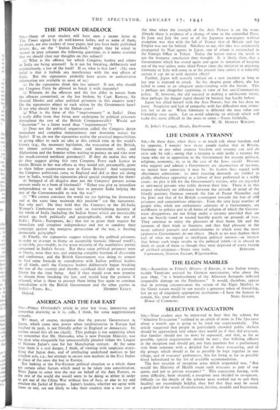THE INDIAN DEADLOCK
SIR,—Many of your readers will have seen a recent letter in The Times signed by 26 well-known ladies, and as some of them, no doubt, are also readers of your paper, and you have lately published letters, &c., on the " Indian Deadlock," might they be asked to answer in your columns the following questions, as it seems essential that we should clear our thoughts on this subject?
(I) What is the offence for which Congress leaders and others in India are being arrested? Is it not for breaking, deliberately and ostentatiously, a law of the land? If so, what is that law? (My own belief is that it forbids any interference with the war efforts of India. But the signatories probably have access to authoritative information not available to most of us.) (2) Do the signatories think this law unjust? If not, why should the Congress Party be allowed to break it with impunity?
(3) Wherein do the offences and the law differ in nature from the offences committed, or the law broken, by Capt. Ramsay, Sir Oswald Mosley and other political prisoners in this country now? Do the signatories object to such action by the Government here? If not why should they in the Indian cases?
(4) What is the form of this " imprisonment " in India? Does it really differ from that being now undergone by political prisoners throughout the rest of the British Commonwealth? Would not "detention " be a fairer word than " imprisonment "?
(5) Does not the political organisation called the Congress desire immediate and complete independence (not dominion status) for India? If so, do not the signatories realise the practical impossibilities of giving effect to such an idea at this critical time in the world's history (e.g., the necessary legislation, the evacuation of the British, the almost certain ensuing chaos and internecine strife, and Afghanistan and the frontier tribes waiting to pounce on and take over the much-coveted northern provinces)? If they do realise this why do they suggest giving this very Congress Party such licence to hinder Britain in her war efforts as they would not, presumably, grant to their fellow countrymen now in Great Britain? And supposing the Congress politicians came to England and did as they are doing now in India, would the signatories plead special exemption for them?
(6) Stripped of all disguise does not the Congress' present action amount really to a form of blackmail? " Either you give us immediate independence or we will do our best to prevent India helping the rest of the Commonwealth to win the war."
(7) " We cannot convince the world we are fighting for democracy and at the same time maintain this position " say the signatories. But why not? Do they hold that the Congress or the All-India Women's Conference represent such an overwhelming majority of the whole of India (including the Indian States which are inextricably mixed up, both politically and geographically, with the rest of India ; Parsis ; Europeans, &c.) that not to grant their request for immediate and complete independence and not to condone their campaign against the energetic prosecution of the war, is flouting democratic principles?
(8) Finally, the signatories suggest releasing the political prisoners in order to attempt to frame an acceptable formula (blessed word!), acceptable, presumably, to the great majority of the numberless parties concerned in India's future. But these same political prisoners were at liberty, were they not, and enjoying complete freedom of discussion and conference, and the British Government was doing its utmost to find some formula in consultation with Indian political leaders of all kinds, until the Congress leaders deliberately began breaking the law of the country and thereby sacrificed their right to personal liberty for the time being. And if they would even now promise to abstain from breaking the law, and would keep the promise if released, what is there to prevent them being free again to continue consultation with the British Government and the other parties in






























 Previous page
Previous page